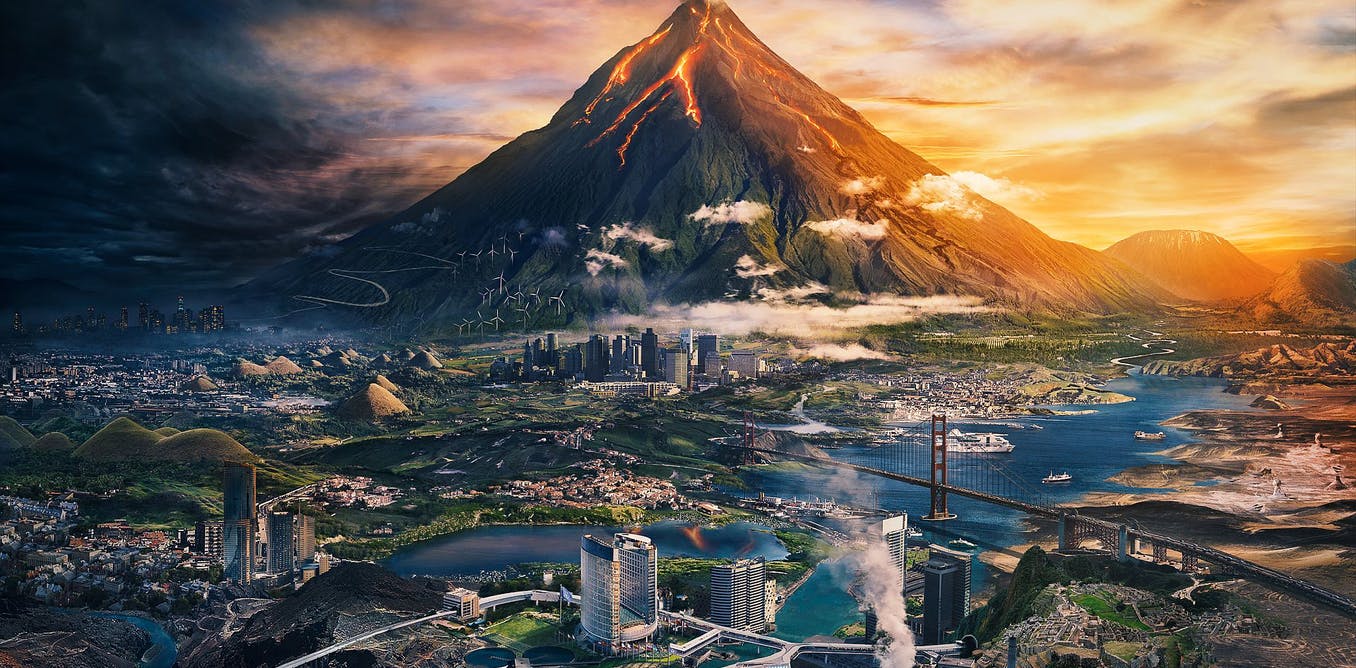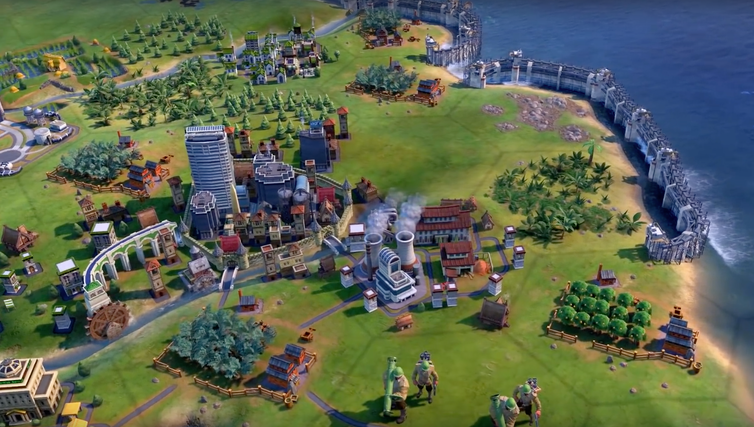Civilization VI: Gathering Storm shows video games can make us think seriously about climate change

Firaxis / Civ VI
A new expansion has added environmental challenges to Sid Meier’s Civilization VI, the latest in a popular series of strategy video games that has been running since the 1990s. The expansion – called Gathering Storm – adds new features to the game, most notably anthropogenic climate change and natural disasters.
The game involves developing a civilisation from its humble beginnings in the Stone Age to nowadays and beyond, while choosing from a vast array of technologies and cultural policies. As the game and the ages progress, your energy choices become increasingly important. Indeed, Gathering Storm is based on a simple model of global warming wherein CO₂ emissions from energy sources induce sea level rise, as well as more frequent and intense extreme weather events such as droughts and storms. In turn, these can have potentially devastating effects on your cities and units, pushing the player to think about different adaptation strategies such as flood barriers for coastal cities.
The game even progresses into a “future era”, where players are offered options like carbon capture and storage technologies or “seasteads” to house segments of the population. From early on, this new expansion compels players to think about some of the potential long-term consequences of actions that may offer short-term benefits. One example would be chopping down forests to accelerate production or convert land for other uses which, in the long run, renders a city more vulnerable to flooding and reduces the carbon sink capacity of your civilisation.

Players can build wind turbines, nuclear plants, flood defences and more.
Sid Meir’s Civilization / youtube
When asked about whether Gathering Storm was somewhat of a political statement, the lead developer, Dennis Shirk, remained largely agnostic: “No, I don’t think that’s about making a political statement. We just like to have our gameplay reflect current science.” It is certainly true that the game does not coerce players into taking any particular pathway, yet it does include a “World Congress” in which climate or deforestation treaties and humanitarian aid can be ratified. We would also argue that the very inclusion of anthropogenic climate change and an associated system of incentives and punishments is inherently a political act. Moreover, in the social studies of science, what one considers to be “current science” has political ramifications.
In the case of Gathering Storm, for example, in most scenarios a player could probably continue to be a “free rider” and rely solely on technological solutions. That is only possible because those technologies are known in advance and players are given virtually perfect information on the different stages of climate change and its effects. One of the consequences is that the game essentially eliminates the very uncertainty which is inherent to the “current science” on climate change and conveys a sense of technological optimism whereby innovations alone can sustain human prosperity.
We are not suggesting that the developers are necessarily liable or even responsible for promoting these views. Rather we wish to illustrate how different depictions of the future can restrict or encourage certain courses of action. The developers could have chosen to make the effects of climate change and access to mitigating technologies more random (although we do not know how difficult that would be to implement in practice nor its effects on gameplay).
Frostpunk, and surviving the ‘volcanic winter’
In contrast to this incidentally optimistic outlook, there is an interesting Polish video game by the name of Frostpunk. Frostpunk is set in a dystopian alternate reality in which a volcanic event has triggered a colossal global ice age. The game’s primary scenario consists of surviving the winter – which gets incrementally colder as time progresses – in “New London”: a settlement of survivors clustered around a large coal-powered generator. The player must choose between a number of difficult policies and options to ensure the survival of the population. These include 24 hour shifts, child labour, corpse disposal strategies and, more drastically, whether to welcome refugees or refuse them entry.

Frostpunk is a city-survival game in a world where ‘heat means life’.
11 bit studios
While Frostpunk does not directly address the issue of anthropogenic climate change, it evokes extreme scientific scenarios (from the 1970s and 1980s) of global cooling and nuclear winters. The game also takes place in what we understand is Victorian Britain, epitomising the industrial revolution and the onset of the new geological era we now live in: the Anthropocene.
Both these games go a long way in engaging and educating their players on climate change, forcing them to deal with the kinds of political and ethical trade-offs that exist in real world decision-making. We highly encourage these innovations, not just in video games but more broadly in bridging the gap between science and the digital arts.
In the academic journal Environmental Communication, we argue that science and the humanities (including the arts) need to work together in the case of complex issues such as climate change, so as to better communicate scientific thinking and its political ramifications. Video games – as interactive and playful products – offer truly exceptional opportunities to do just that. We welcome these initiatives with open arms, so long as they remain responsible and stimulate critical thinking.

Noam Obermeister receives funding from the Economic and Social Research Council Doctoral Training Partnership at the University of Cambridge.
Elliot Honeybun-Arnolda receives funding from a Faculty of Science Studentship at the University of East Anglia.




